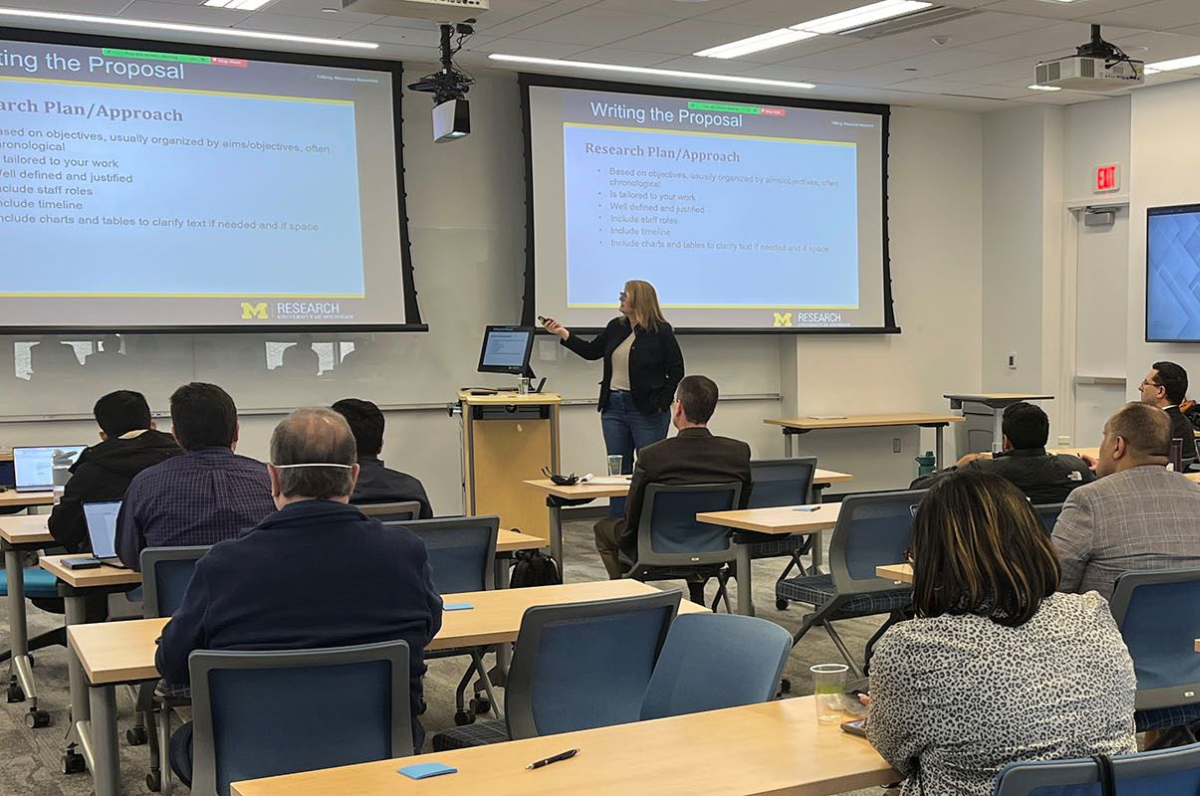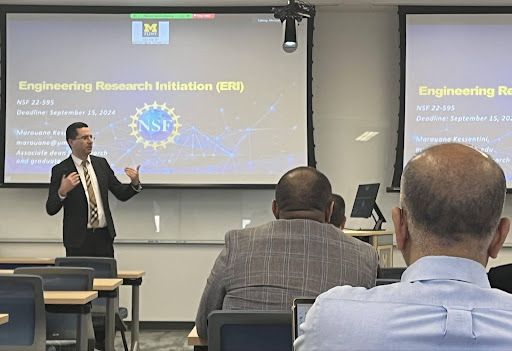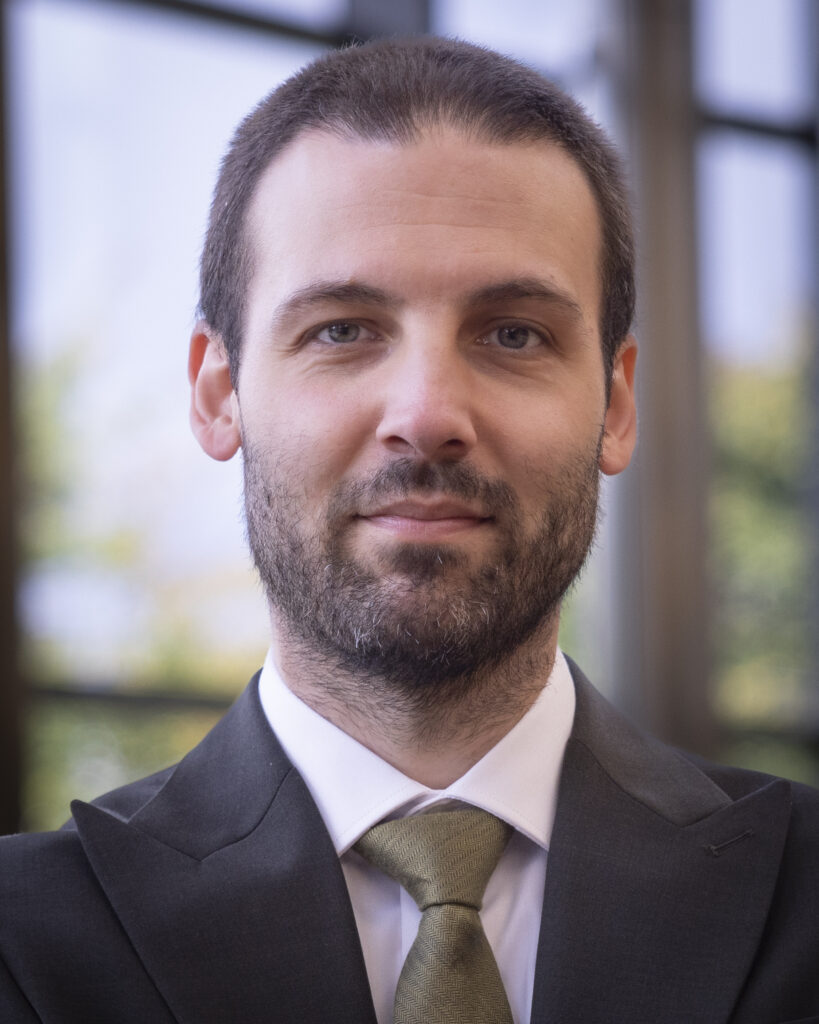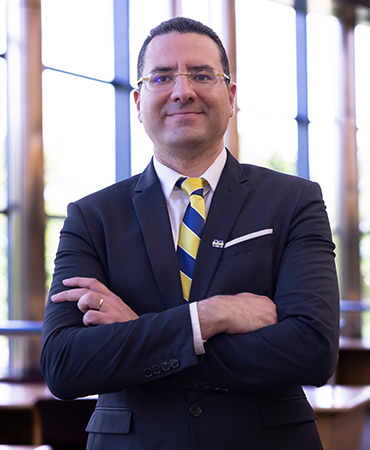Surge in federal grant funding in CIT demonstrates strategic planning in action

The College of Innovation & Technology at the University of Michigan-Flint announced more than $4.5 million in grant funding in the first part of the 2024 fiscal year, showing high returns from investments in the strategic planning, hiring, and revitalization processes implemented by the college in the past year.
"As we continue to work towards our strategic planning goals, we are so proud of our faculty for reaching those higher goals in research productivity," said Christopher Pearson, CIT dean. "We have made critical investments in faculty hiring, devoted greater resources towards training faculty in proposal development, and partnered with Ann Arbor's Office of the Vice President of Research. These efforts work toward just one part of CIT's polytechnic vision and are critical aspects to the growth of industry partnerships, and establishment of applied research centers. In the end, all faculty, students and external partners will benefit."

"The research funding growth of CIT in a short period of time is evidence of the commitment of our faculty to innovation and translational research to serve our students, the local community, industry, and society," Kessentini said. "We all worked together to implement an ambitious strategic plan to grow graduate education and research. We thought that we would achieve $5 million in annual research funding by 2028 but we already achieved that goal this year. Our focus now is sustaining this growth; the future of CIT and UM-Flint is bright."
Leading by example, Kessentini is directly involved in seven projects and works with individual and faculty working groups to develop innovative ideas, new proposal plans, and ways to engage with industry and the local community for broader impacts. Working with the Office of Sponsored Research at UM-Ann Arbor, Kessentini is directing CIT-hosted, bimonthly workshops for faculty interested in proposing research work for federal funding through the National Science Foundation. Along with CIT, faculty from other schools and colleges at UM-Flint are also participating in the workshops aimed at interdisciplinary project planning. Future grant workshop series are being planned for understanding funding mechanisms from the National Institutes of Health and other federal agencies.
Sponsored programs included in the $4.5 million total come from various projects in three broad categories: fundamental research, industry-focused partnerships, and greater community partnerships. Fundamental research awards advance fundamental science and technology knowledge in the field. Industry-focused partnerships strengthen research-related advancements with industry partners or projects that form an industrial purpose, such as applied research projects. Community partnership projects include the larger southeast Michigan region, often centering on human, social and environmental research questions, and frequently in partnership with community groups.
CIT sponsored programs: fundamental research

Doug Zytko, associate professor of computing, is the principal investigator on the NSF collaborative human-centered computing project, "Understanding Online-to-Offline Sexual Violence through Data Donation from Users."

Kessentini is the PI for two new fundamental research grants, including the project "Elements: An Infrastructure for Software Quality and Security Issues Detection and Correction," funded for $539,180; and the collaborative project from NSF Community Research Infrastructure on "A Software Refactoring Community Infrastructure," funded for $427,525.

Khalid Malik, director of the cybersecurity program and professor of computing, also has a new NSF Partnerships for Innovation grant for "Development of an Explainable and Robust Detector of Forged Multimedia and Cyber Threats using Artificial Intelligence," awarded $549,156 for two years. His proposal, "Hemorrhagepredictor: A Multimodal, Neuro-symbolic, and Federated AI-based Tool for Improved Aneurysm Detection and Rupture Prediction" was also funded by the Brain Aneurysm Foundation and the Michigan Translational Research and Commercialization Innovation Hub for Life Sciences. Mailk also received an MTRAC grant for "NeuroAssist: Identifying the Risk and Clinical Management to Hemorrhagic and Ischemic Stroke using Decentralized AI."

Mark Allison, associate professor of computing, will lead the UM-Flint research team on a collaborative NSF-funded project, "An Edge-Based Approach to Roust Multi-Robot Systems in Dynamic Environments," a two-year project through his partnership with the University of North Texas.
CIT sponsored programs: industry-focused partnerships
Grants under the industry-focused partnerships category strengthen CIT connections with industry and student research involvement in innovative projects. Projects may also focus on creating technology transfer and commercialization of new products born from research labs and contributing to the Michigan economy. New grants that include these industry connections include the following:
- Kessentini was awarded a $90,000 MTRAC grant for "Intelligent Software Defined Vehicle Management Technology," a project that aims to build a system of embedded containers, workflows, and an intelligent algorithm that can balance the use of resources in response to constantly changing vehicle needs and priorities. He also brings $214,166 for the NSF PFI-funded project, "Intelligent Software Refactoring Bot for Continuous Integration," as well as $360,000 for the NSF Industry University Cooperative Research Center for Pervasive Personalized Intelligence. UM-Flint recently hosted a PPI Center meeting showcasing the work of this group. Finally, Kessentini also achieved funding from the NSF Innovation Corps for "Smart Software Defined Vehicle Management Technology." I-CORPS is an immersive, entrepreneurial training program that facilitates the transformation of invention to impact.
- Malik was recently awarded $324,000 for an industry partnership with Netstar, for cybersecurity industry research. This project involves the development of a multilingual text-based multimodal neuro-symbolic large language model for URL classification and web filtering, ensuring cybersecurity, productivity, and a secure online environment.
CIT sponsored programs: greater community partnerships
Community partnerships are a central component of CIT's strategic approach, and sponsored projects contributing to this goal are a significant part of the funding achievement.

Heather Dawson, professor of biology, will pursue sponsored research on "Ensuring Fish Passage of Priority Species through Active Implementation," and "Fish Passage at a Flint River Dam Removal." These grants were awarded by the Department of Interior and Michigan Department of Natural Resources, respectively, for a total of $106,744 over multiple years. Additionally, the Charles Stewart Mott Foundation provided $106,000 in funding for Flint River testing and monitoring which she and her students will complete before communicating the results to the public. More sponsored projects involving community partners include her work in "Highlighting the Flint River to the community and beyond; Developing an Environmental Sustainability Plan with the Flint Community;" and "Feasibility study of a solar co-operative in Flint." These grants, totaling $28,000, were awarded by the Community Foundation of Greater Flint and UM-Ann Arbor's Graham Sustainability Institute, respectively. The latter grant is the first Catalyst Grant awarded to UM-Flint, and the purpose of these grants is to address critical sustainability challenges.
Allison was awarded NSF Early-concept Grants for Exploratory Research funding for "AI in Sleep for Rural and Aging Communities." The EAGER program supports exploratory work in its early stages on untested, but potentially transformative, research ideas or approaches.
Finally, Kessentini and Zytko have been awarded the first NSF Research Experience for Undergraduates grant for "Research Experience for Undergraduates in Digital Accessibility." The NSF REU program supports active research participation by undergraduate students in any of the areas of research funded by the National Science Foundation. REU projects involve students in meaningful ways in ongoing research programs or in research projects specifically designed for the REU program. The Flint campus project will focus on digital accessibility, and will enable new opportunities for students with and without disabilities to be involved in digital accessibility research. Faculty will seek to bridge the digital divide with the involvement of many community partners, ensuring that individuals with diverse abilities can leverage the advancements in technology, leading to a more inclusive and equitable digital society.
Related Posts
No related photos.
Laurel Ming
Laurel Ming is the office manager for the College of Innovation & Technology. She can be reached at [email protected]